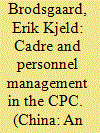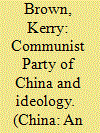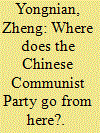|
|
|
Sort Order |
|
|
|
Items / Page
|
|
|
|
|
|
|
| Srl | Item |
| 1 |
ID:
114590


|
|
|
|
|
| Publication |
2012.
|
| Summary/Abstract |
China's overseas direct investment (ODI) is a recent development and its scale is still small. Although it has expanded to cover a range of industries from traditional to high-tech and servicing industries, its overall structure is not yet rational and its geographical distribution is concentrated in the Asian and African regions. Of China's ODI, private enterprises account for only a small amount. They lack advanced technology and expand into the international market mainly through price competition. Faced with an increasingly harsh international financial situation, China must develop plans that are more carefully selected, and improve the industrial chains in those regions that accept its investments.
|
|
|
|
|
|
|
|
|
|
|
|
|
|
|
|
| 2 |
ID:
114588


|
|
|
|
|
| Publication |
2012.
|
| Summary/Abstract |
This article addresses some of the most important mechanisms and instruments in the Communist Party of China's (CPC) management of key officials and administrative personnel: Party and state cadres in administrative organs and institutions. These mechanisms include control over the administrative layout in terms of organs and positions (bianzhi), the authority to appoint leading personnel (nomenklatura), as well as a sophisticated cadre transfer system - which also involves rotation between big business and the political world. The article not only emphasises the crucial importance of cadre management in understanding the fundamentals of the Chinese power system, but it also points to a number of challenges in studying this particular Chinese form of personnel management. It shows the elaborate nature of cadre and personnel management in China and argues that in recent years the Party has strengthened rather than weakened its role in managing the cadre corps. Finally, the article draws on theoretical insights provided by the existing body of literature on elites in general and in relation to China in particular.
|
|
|
|
|
|
|
|
|
|
|
|
|
|
|
|
| 3 |
ID:
114587


|
|
|
|
|
| Publication |
2012.
|
| Summary/Abstract |
The People's Republic of China since 1978 has been called a post-Communist and post-ideological society. And yet, at least in terms of maintaining an institutional network of party schools and think tanks, and a common conceptual language for the political elite within the Communist Party, China continues to put resources and effort into what could be construed as ideological work. What is the function of this, in a society which is undergoing dynamic economic and social reform? Does ideology continue to perform a role in building up cohesiveness amongst the political elite in contemporary China, and if so, how? This article looks at the ways in which ideology is formulated in the key speeches of Hu Jintao and in the institutional and linguistic context of these.
|
|
|
|
|
|
|
|
|
|
|
|
|
|
|
|
| 4 |
ID:
114591


|
|
|
|
|
| Publication |
2012.
|
| Summary/Abstract |
In recent years, the economic development of China's Yangtze River Delta, especially the foreign direct investment, has attracted the attention of academics in China and abroad. Through regression analysis, a strong correlation is found between foreign direct investment and the development of the Yangtze River Delta Region. The Cobb-Douglas production function and Thoro-Swan growth model are used with selected panel data for the 2000 to 2008 period, yielding quantitative measurement and analysis of the contributions of labour and capital investment to the economic growth of the Yangtze River Delta Region. It is concluded that foreign direct investment in the region has created jobs and increased the efficiency of labour resources. Furthermore, empirical analysis supports the likelihood of crowding-in and crowding-out effects of regional internal investment. It is also concluded that foreign direct investment has had a crowding-in effect on regional economic development.
|
|
|
|
|
|
|
|
|
|
|
|
|
|
|
|
| 5 |
ID:
114584


|
|
|
|
|
| Publication |
2012.
|
| Summary/Abstract |
As the world anticipates the 18th Congress of the Communist Party of China (CPC) in October 2012, international scholars and specialists of the CPC have been assessing the strengths and weaknesses of the Party and positing a series of forecasts about its potential future evolution. This article reviews and categorises this scholarship. It argues that since 2009, political and inner-Party reforms that had been pursued since 1997 have stagnated and retrogressed, and that the CPC needs to return to a proactive political reform agenda in order to tackle the many pressing social, economic, intellectual and political challenges that it faces.
|
|
|
|
|
|
|
|
|
|
|
|
|
|
|
|
| 6 |
ID:
114585


|
|
|
|
|
| Publication |
2012.
|
| Summary/Abstract |
The transformation of China from an all-powerful strongman-dominated political system to its current structure of collective leadership has generated new institutional rules and norms in elite politics. Over the past decade, top Chinese leaders have begun using the term "intra-Party democracy" to describe the idea that the Communist Party of China (CPC) should institutionalise checks and balances within its leadership. This development in turn has affected political dynamics and elite behaviours. This article reviews the CPC's institutional development in the reform era and discusses the challenges and opportunities that the CPC is encountering on the eve of the 18th Party Congress.
|
|
|
|
|
|
|
|
|
|
|
|
|
|
|
|
| 7 |
ID:
114583


|
|
|
|
|
| Publication |
2012.
|
| Summary/Abstract |
In the autumn of 2012, the Communist Party of China (CPC) will hold its 18th Party Congress. These five-yearly rituals always offer a good opportunity for foreign scholars and analysts to take stock of the "state of the Party". This Congress is particularly important as such a large leadership transition will occur in all major national-level Party institutions (the Central Committee, Central Military Commission, Politburo and its Standing Committee), and the so-called "fifth generation" will take office. But the questions surrounding the CPC today extend much more broadly and deeply than simply the new leaders who will attempt to govern China - the really important questions are more systemic and institutional in nature.
|
|
|
|
|
|
|
|
|
|
|
|
|
|
|
|
| 8 |
ID:
114586


|
|
|
|
|
| Publication |
2012.
|
| Summary/Abstract |
With new leaders about to come to power in China, the ruling Communist Party is making significant changes to its development model. This article looks at three key trends: the promotion of "national champions" and "indigenous innovation" to create distinctive Chinese brands that can compete in foreign markets; an emphasis on more domestic consumption and less reliance on exports and infrastructure spending as the engine of growth; and experiments with various political reforms at the local level that are designed to help the Party govern better. Together, these changes constitute important differences from what has come to be known as the "China Model". What challenges does the Party face in this transition? What will be the political implications of these changes?
|
|
|
|
|
|
|
|
|
|
|
|
|
|
|
|
| 9 |
ID:
114589


|
|
|
|
|
| Publication |
2012.
|
| Summary/Abstract |
The predicament of political reform that China faces today is that while people are increasingly aware of its importance, they lack a basic consensus on what to reform and how. This article argues that political reform cannot be achieved by utopianism but must be based on Chinese political practice. The practice in Chinese politics in the era of reform and opening demonstrates that political reform has three main dimensions, namely, open party, meritocratic competition and public participation. First, the ruling party, the Chinese Communist Party (CPC), tends to become increasingly open, which is leading to an open political system. Second, an open political system is gradually leading to limited political competition among political elites, based on the traditional notion of meritocracy. And third, with political competition, social participation is gradually being materialised. Overall, openness, competition and participation are the essential characteristics of the so-called Chinese political model. This article also argues that while China's political system is developing these characteristics, there are enormous challenges ahead for the realisation of these political values. But, if the intra-Party democracy cannot be substantiated, the future of the CPC is uncertain.
|
|
|
|
|
|
|
|
|
|
|
|
|
|
|
|
|
|
|
|
|